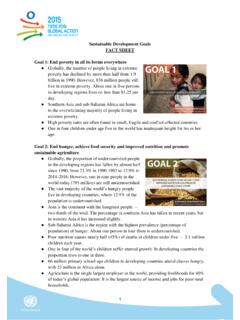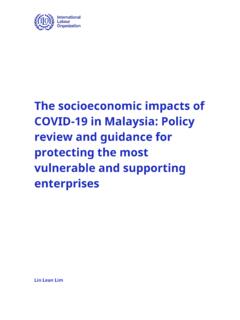Transcription of The Role of Agriculture in African Development
1 The Role of Agriculture in African DevelopmentXINSHEN DIAOI nternational Food Policy Research Institute, Washington, DC, USAPETER HAZELLU niversity of London, UKandJAMES THURLOW*International Food Policy Research Institute, Washington, DC, USAS ummary. Widespread rural poverty in Africa and the success of Asia s Green Revolution suggest that Agriculture is a key sector forAfrican Development . However, in response to recent skepticism, this paper examines whether the conventional wisdom about agricul-ture s contribution to the Development process can still be applied to Africa today.
2 We first outline the debate between the proponents ofagriculture and its skeptics before presenting a series of case studies reflecting the heterogeneity of initial conditions facing low-incomeAfrican countries. Drawing on economy-wide modeling, these case studies contrast the effectiveness of alternative growth strategies inreducing poverty. The findings indicate that while Africa does face many new challenges unlike those faced by Asian countries, there islittle evidence to suggest that these countries can bypass a broad-based agricultural revolution to successfully launch their economictransformations.
3 2010 Elsevier Ltd. All rights words Agriculture , rural Development , poverty, Africa1. INTRODUCTIONA majority of sub-Saharan Africa s population live in ruralareas where poverty and deprivation are the most severe. Sincealmost all rural households depend directly or indirectly onagriculture, and given the sector s large contribution to theoverall economy, it might seem obvious that agricultureshould be a key sector in Development . However, while agri-culture-led growth has played an important role in reducingpoverty and transforming the economies of many Asian coun-tries, the strategy has not yet worked in Africa.
4 Most Africancountries have failed to meet the requirements for a successfulagricultural revolution, and productivity in African agricul-ture lags far behind the rest of the world. This has recentlyled to renewed debate within the international developmentcommunity concerning the role of Agriculture , particularlysmall farms, in African paper considers whether the conventional wisdomabout Agriculture s contribution to the Development processcan still be applied to Africa today. In Section2we briefly re-view the conventional wisdom and outline the current debatebetween the proponents of Agriculture and its skeptics.
5 Then,in Section3, we present a series of case studies reflecting theheterogeneity of initial conditions facing low-income Africancountries. Drawing on economy-wide modeling, these casestudies evaluate alternative growth strategies and their impacton poverty. The poverty-growth elasticities resulting fromaccelerating growth in different sectors are calculated in orderto estimate the relative effectiveness of Agriculture - and indus-try-led growth in reducing poverty. The paper concludes bysummarizing the findings and drawing implications for theongoing debate on the role of Agriculture in African CONVENTIONAL WISDOM AND CURRENTDEBATEThe perceived role of Agriculture in growth and developmenthas changed considerably over the last half-century.
6 Buildingon the dual economy model, early theorists viewed economicdevelopment as a growth process requiring the reallocationof factors of production from a backward, low-productivityagricultural sector to a modern industrial sector with higherproductivity and increasing returns (Lewis, 1954). As a tradi-tional sector, Agriculture was seen to contribute passively todevelopment by providing labor and food to the industrializa-tion process. However, this view was swept aside by the dyna-mism of the Green Revolution in Asia during the late 1960sand early 1970s. The possibility of transforming traditionalagriculture into a modern sector demonstrated Agriculture spotential as a growth sector and its active role in initiatingbroader Development (Adelman, 2001).
7 1 While the impor-tance of linkages between Agriculture and non- Agriculture indriving the growth process had long been recognized (Hirsch-man, 1958; Johnston & Mellor, 1961), post-Green Revolutiontheorists emphasized the role of Agriculture inruraldevelop-ment (Haggblade, Hammer, & Hazell, 1991; Haggblade,Hazell, & Brown, 1989; Hazell & Haggblade, 1991; Hazell &Roell, 1983). The positive impact of agricultural growth onrural Development was found to be strongest in countrieswhere small farms dominated Agriculture (Rosegrant &Hazell, 2000). Therefore, given widespread rural poverty andsmall-scale farming in Africa, the conventional wisdom supports a strong role for Agriculture in African Development .
8 *Final revision accepted: June 23, DevelopmentVol. xx, No. x, pp. xxx xxx, 2010 2010 Elsevier Ltd. All rights $ - see front cite this article in press as: Diao, Role of Agriculture in African Development ,World Development (2010), , there is a growing debate over whether traditionaldevelopment theories still apply, and accordingly, whetheragriculture can contribute significantly to growth in sub-Saharan Africa. Agriculture s proponents suggest that, inmany African countries, only the agricultural sector has suffi-cient scale and growth-linkages to significantly influenceaggregate growth.
9 Moreover, to significantly reduce poverty,it will be necessary to promote shared growth (Birdsall,Ross, & Sabot, 1995) and substantially raise incomes for amajority of Africa s population. Achieving such growth willhave to involve a large sector like Agriculture , which accountsfor one-third of gross domestic product (GDP) for the subcon-tinent as a whole, and an even larger share for two-thirds ofAfrican countries. Proponents also suggest that Agriculture spoor performance reflects inadequate investment and policiesthat are historically biased against the agricultural sector(Fan, Zhang, & Rao, 2004; Schiff & Valdez, 1992; Timmer,2005).
10 They emphasize the large gains from investing in ruralinfrastructure and agricultural technology, and the growth po-tential from catching up to the productivity levels of otherdeveloping , proponents of Agriculture sug-gest that there are few viable alternatives to Agriculture , espe-cially given many African countries small and poorlyperforming industrial sectors. During 1990 2004, Africanindustry, including mining and mineral-based manufacturing,grew at per year compared to for Agriculture (World Bank, 2006).3 Africa also faces increasing competitionfrom large emerging economies like China and India, whichmay undermine attempts to develop labor-intensive manufac-turing contrast, those skeptical of Agriculture doubt whetheragriculture can successfully generate sufficient growth in Afri-ca today.

